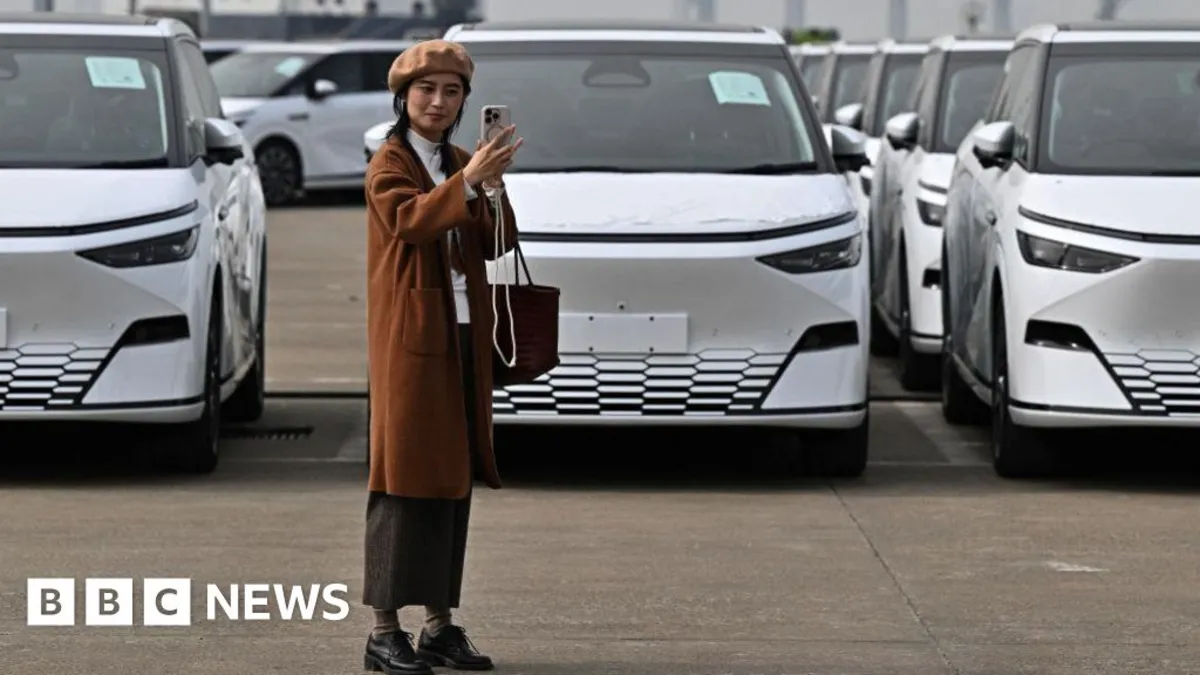
At a bustling charging station on the outskirts of Guangzhou, private hire driver Lu Yunfeng candidly states, "I drive an electric vehicle because I am poor." Nearby, fellow driver Sun Jingguo echoes this sentiment, noting that the high costs of petrol make electric vehicles (EVs) a more economical choice. "I save money driving an electric vehicle," he adds while leaning against his white Beijing U7 model. This perspective is exactly what climate advocates hope to hear, as in many other nations, electric vehicles are often viewed as luxury items. However, in China, where nearly half of all cars sold last year were electric, this notion is shifting towards a more pragmatic reality.
China's transformation from a nation once dominated by bicycles to the world's leading manufacturer of electric vehicles has been nothing short of remarkable. Over 18 million people in Guangzhou now experience a quieter rush hour, thanks to the rise of EVs. According to auto sector analyst Michael Dunne, "When it comes to EVs, China is 10 years ahead and 10 times better than any other country." The Chinese company BYD has now overtaken its U.S. counterpart, Tesla, to lead the global EV market. With a domestic market exceeding 1.4 billion people, BYD is also expanding its reach to international markets.
The roots of China's dominance in the EV sector can be traced back to the early 2000s, particularly under the leadership of Wan Gang, a German-trained engineer and former minister of trade and science. Recognizing that foreign brands were dominating the streets of major cities like Beijing and Shanghai, Wan initiated a shift towards electric vehicles. Despite the early inclusion of EVs in China's five-year economic plans, substantial government subsidies only began in the 2010s. The Chinese government's ability to mobilize large segments of the economy towards its objectives is a significant factor in its success.
According to a report by the Center for Strategic and International Studies (CSIS), Beijing has invested approximately $231 billion in the development of the EV industry from 2009 to the end of 2023. This funding has allowed companies like BYD to pivot from smartphone battery production to electric vehicle manufacturing, while CATL, a battery supplier founded in 2011, now produces a third of the world's EV batteries.
Government support has been vital in creating a robust infrastructure, including the world's largest public charging network, which is concentrated in major cities. "If you want to manufacture a battery for an electric car today, all roads go through China," says Dunne. This has led to a competitive environment for electric vehicle manufacturers, fostering innovation and growth. Brian Gu, president of XPeng, states that the Chinese government has created a competitive landscape that benefits all companies, domestic and foreign alike.
Young Chinese consumers are increasingly drawn to high-tech electric vehicles, which are supported by substantial government subsidies that make them financially appealing. According to CSIS, the public receives incentives for trading in their petrol cars for EVs, as well as tax exemptions and subsidized charging rates. For Lu, transitioning to an electric vehicle two years ago meant substantial savings—his driving costs dropped from 200 yuan ($27.84; £20.72) for a 400km trip to just a quarter of that amount.
In Shanghai, another EV owner named Daisy opts for battery swapping rather than traditional charging. She takes advantage of Nio's automated battery swapping stations, which replace her flat battery with a fully charged one in under three minutes—an innovative solution that offers convenience at a lower price than a tank of fuel.
While China's EV growth is impressive, it has drawn criticism from other countries concerned about the fairness of government subsidies. The U.S., Canada, and the European Union have imposed significant import taxes on Chinese EVs. However, the UK has opted not to follow suit, making it a promising market for companies like XPeng and BYD, which are already making inroads into British consumers' preferences.
With several Western nations planning to ban petrol and diesel car sales by 2030, the role of electric vehicles is becoming increasingly pivotal. As Dunne notes, "The Chinese are thinking about a future where they manufacture just about every single car for the world." Despite the environmental benefits of EVs, concerns remain about national security and data privacy related to Chinese technology.
In a recent BBC interview, BYD's executive vice-president Stella Li dismissed fears about the security of Chinese EVs, asserting that the company maintains high standards of data protection. Even amid skepticism, Guangzhou's Sun Jingguo maintains a positive outlook, saying, "I think the world should thank China for bringing this technology to the world." With such transformative changes underway, the future of electric vehicles in China—and globally—looks bright.